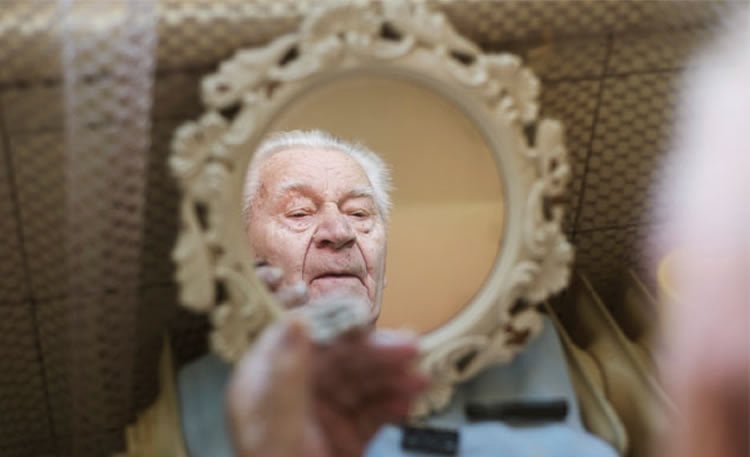New findings from face perception research.
Alzheimer’s not only steals people’s memories but also their ability to recognize faces, which widens the gulf between people with this disease and their loved ones. A recent study has demonstrated that, beyond causing memory problems, Alzheimer’s disease also impairs visual face perception. This finding may help families better understand their loved one’s inevitable difficulties and lead to new avenues to postpone this painful aspect of the disease. Research in this area by the team of Dr. Sven Joubert, PhD, a researcher at the Centre de recherche de l’Institut universitaire de gériatrie de Montréal and a professor with the Department of Psychology at Université de Montréal, will be published tomorrow in the Journal of Alzheimer’s Disease.
Face perception plays a fundamental role in human communication, which is why humans have evolved into experts at quickly detecting and identifying faces. This faculty is thought to depend on the ability to perceive a face as a whole. Also known as “holistic perception,” this ability is in contrast to the local and detailed analysis required to perceive individual facial features, such as the eyes, nose or mouth. Dr. Joubert’s study has demonstrated that the holistic ability to perceive faces is impaired by Alzheimer’s disease.
For the study, the Montreal team recruited people with Alzheimer’s along with healthy seniors to study their ability to perceive faces and cars in photos that were either upright or upside down. Dr. Joubert explains the team’s findings: “The results for people with Alzheimer’s were similar to those in the control group in terms of answer accuracy and the time to process the upside-down faces and cars. To perform these tasks, the brain must perform a local analysis of the various image components perceived by the eye. However, with the upright faces, people with Alzheimer’s were much slower and made more mistakes than the healthy individuals. This leads us to believe that holistic face recognition in particular becomes impaired. Subjects with Alzheimer’s disease also demonstrated normal recognition of the upright cars, a task that in theory does not require holistic processing. This suggests that Alzheimer’s leads to visual perception problems specifically with faces.” What’s also surprising about this impairment is that it is observed in the early stages of the disease.

Overall, Dr. Joubert’s study better explains the mechanism involved in the problem that people with Alzheimer’s have with recognizing the faces of family members or celebrities. The fact that impaired facial recognition might stem from a holistic perception problem–and not just a general memory problem–opens the door to different strategies (such as the recognition of particular facial traits or voice recognition) to help patients recognize their loved ones for longer.
Source: Genevieve Desrosiers – University of Montreal
Image Credit: The image is adapted from the University of Montreal press release.
Original Research: Abstract for “A Qualitative Impairment in Face Perception in Alzheimer’s Disease: Evidence from a Reduced Face Inversion Effect” by Lavallée, Marie Maxime; Gandini, Delphine; Rouleau, Isabelle; Vallet, Guillaume T.; Joannette, Maude; Kergoat, Marie-Jeanne; Busigny, Thomas; Rossion, Bruno; and Joubert, Sven in Journal of Alzheimer’s Disease. Published online February 26 2016 doi:10.3233/JAD-151027
Abstract
A Qualitative Impairment in Face Perception in Alzheimer’s Disease: Evidence from a Reduced Face Inversion Effect
Prevalent face recognition difficulties in Alzheimer’s disease (AD) have typically been attributed to the underlying episodic and semantic memory impairment. The aim of the current study was to determine if AD patients are also impaired at the perceptual level for faces, more specifically at extracting a visual representation of an individual face. To address this question, we investigated the matching of simultaneously presented individual faces and of other nonface familiar shapes (cars), at both upright and inverted orientation, in a group of mild AD patients and in a group of healthy older controls matched for age and education. AD patients showed a reduced inversion effect (i.e., larger performance for upright than inverted stimuli) for faces, but not for cars, both in terms of error rates and response times. While healthy participants showed a much larger decrease in performance for faces than for cars with inversion, the inversion effect did not differ significantly for faces and cars in AD. This abnormal inversion effect for faces was observed in a large subset of individual patients with AD. These results suggest that AD patients have deficits in higher-level visual processes, more specifically at perceiving individual faces, a function that relies on holistic representations specific to upright face stimuli. These deficits, combined with their memory impairment, may contribute to the difficulties in recognizing familiar people that are often reported in patients suffering from the disease and by their caregivers.
“A Qualitative Impairment in Face Perception in Alzheimer’s Disease: Evidence from a Reduced Face Inversion Effect” by Lavallée, Marie Maxime; Gandini, Delphine; Rouleau, Isabelle; Vallet, Guillaume T.; Joannette, Maude; Kergoat, Marie-Jeanne; Busigny, Thomas; Rossion, Bruno; and Joubert, Sven in Journal of Alzheimer’s Disease. Published online February 26 2016 doi:10.3233/JAD-151027






